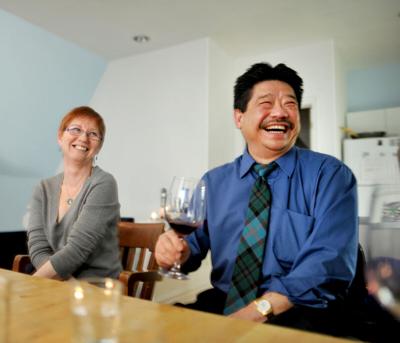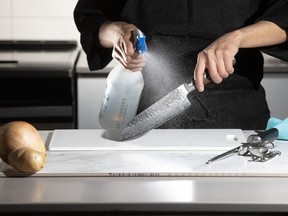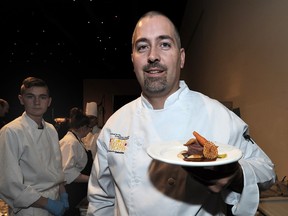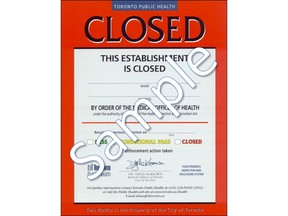Toronto Star
Mintz: Dining with Mr. DineSafe
Jim Chan, the manager of food safety for Toronto Public Health, comes from dinner and awards our writer a green pass.

Jim Chan, the amiable manager of food safety for Toronto Public Health, smiles throughout dinner as his wife Janice looks on.
A smiling Jim Chan opens my fridge. He aims his Thermor PS200, a tricorder-looking device that can read temperatures from across the street. It confirms the reading of my fridge’s thermometer, hurriedly purchased this afternoon in anticipation of dinner with the manager of food safety for Toronto Public Health.
Chan happily notes that my 30 pounds of chicken is on the bottom shelf, with a tray to collect any dripping. After warning me not to store anything under my prep table, he writes me a green pass, which I proudly display in my window. It is now officially safe to eat in my home.
The colour-coded cards that must be displayed in all Toronto food business windows — green for pass, yellow for conditional pass, red for closed — were hard won.
Chan, who studied microbiology at the University of Guelph, has been with the department for 30 years. When Toronto amalgamated in 1998, six health units (whose rulings were often ignored by operators) were rolled into one agency. A series of Toronto Star articles pushed the city into action, resulting in the transparent DineSafe website, on which all details of food inspections can be accessed by the public. In the last decade, compliance has gone from 78 percent to over 90 percent.
Because the city can’t be looking over everyone’s shoulders all the time, the focus is on educating restaurateurs so that they understand proper sanitation guidelines.
Possibly, my kitchen gets graded on what I call the Chinatown curve.
“If we apply the regulation to everybody equally, I don’t think there will be too many restaurants left in Toronto,” says Chan, always smiling. “One good example is the Asian barbecue.” Rather than outlaw the cooked pigs hanging in unrefrigerated windows all across the city, they spent time testing, understanding the food. “So that developed into allowing them to hang the whole duck and the whole barbecue pork for not more than four hours.”
Chan and his wife Janice are at the table, their backs to me in the kitchen. So who’s to say I’ve been washing my hands while assembling our meal?
We’re having bacon, pickled turnip and chili paste wrapped in arepas, the result of a recent experiment. Waking to find nothing fresh in the fridge, I’d assembled the oddball sandwich, hoping it would be edible. It immediately jumped onto this week’s menu. (The chicken is for an upcoming party.)
Chan and his department qualify as heroes because they work hard, at their own personal risk (angry restaurateurs have knives on hand) to keep us safe. As a colleague recently put it, any food writer who doesn’t get violently ill on a regular basis isn’t doing their job. To say that Chan has saved my life more than once is no exaggeration.
One problem in this town is that Torontonians want the freedom to buy a cup of ceviche on the street, but still pray to Superman for protection from the salmonella boogeyman. In the case of Toronto’s disastrous A La Carte street food program, the public’s conflicting demands for libertarianism and expectations of babyproofing resulted in a launch worth its weight in disappointing biryani.
The street food movement isn’t dead in the water though. The hot dog vendors association is in discussion with the city to add barbecue corn to menus.
“From a risk assessment point of view, we have no objections,” says Chan. “It looks like they’re probably going to be pioneering some changes after their series of meetings with some councillors.”
Chan has stories for days, most of them centering on my Chinatown neighbourhood: a bakery selling buns accidently made with toilet cleaner; a store selling fake tiger penis; writing his signature into grease to illustrate that the kitchen hasn’t been cleaned since the last inspection.
“The majority of the food operators out there are very good, or they’re trying to do their best.” But he says certain cockroach museums (which we won’t name here) keep him busy. “There are a very small number of them that are we are continuously spending the majority of resources on.”
I tell him excitedly about a little stall I found that barbecues yams.
“They’ve been shut down before,” Chan says, stressing that they’ve cleaned up their act. “It’s actually owned by the same people that own the bakery.”








